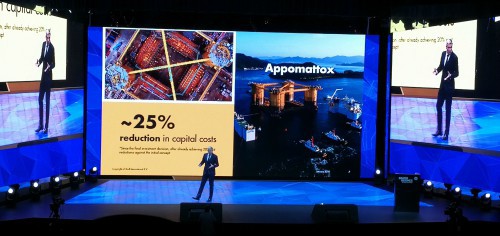BHGE AM '18: Shell exec calls for greater energy renaissance
FLORENCE - By Adrienne Blume, Executive Editor, Hydrocarbon Processing and Editor, Gas Processing

On Day 1 of the BHGE Annual Meeting (BHGE AM), Royal Dutch Shell PLC's Projects and Technology Director, Harry Brekelmans, shared his ideas about what has been accomplished—and how much more needs to be accomplished—in the ongoing energy renaissance.
"A real renaissance requires change," the Director said, in opening. "You could argue that the rebirth is well underway, but frankly, and personally, I think it's just beginning."
Speaking on the present state of the industry, Mr. Brekelmans noted, "We are still in a time of market volatility. We see significant price uncertainty, and we are moving towards a lower-price energy system. That requires change to be ready for the future."
Shell's strategy builds on strengths.
Shell is focused on remaining consistent with its aspirations to be a world-class investment case, to thrive in the energy transition and to earn a strong societal license to operate, the Director noted.

With the company's February 2016 acquisition of BG Group, Shell was able to significantly expand in deepwater and integrated gas. Shell also implemented a $30-B divestment program of non-core assets, and streamlined its business operations.
The company continues to build on the strength of its oil, gas and chemicals business, and laying foundation for future growth, Mr. Brekelmans said. To this end, Shell in 2016 established its New Energies business.
Among the ongoing initiatives of this business, Shell is operating a second-generation biofuels plant in Brazil, and it acquired the largest provider of electrical vehicle charging facilities in Europe.
Optimization of GOM upstream projects. Shell has also made strides in improving capital efficiency in the upstream. The Director cited four Gulf of Mexico (GOM) deepwater projects where it has implemented performance improvements and/or reduced costs: Stones, Appomattox, Vito, and Kaikias.
Stones is the world's deepest oil and gas project. Shell improved the shape of the project in two ways. First, it focused on performance improvement in the construction of the FPSO and in the drilling components. With these improvements, initial wells that formerly took 150 days to drill take only 60 days today, Mr. Brekelmans said.
The Appomattox project, meanwhile, has seen a 25% improvement in costs, even after a final investment decision (FID) was taken.
At the Kaikias project, Shell implemented a 50% reduction in capital costs compared to initial estimates through operational improvements, supply chain savings, minimization of redundancies, simplification of subsea architecture and other initiatives.
Lastly, Shell is studying optimization options and CAPEX streamlining for the Vito project, a potential new deepwater hub in the US GOM. FID has not yet been taken for the project.
Digitalization is key for advancement. On the subject of digitalization, Mr. Brekelmans noted, "We see it as one of the key drivers to improve capital efficiency, as well as operational excellence." Digitalization efforts yield huge volumes of data for critical, real-time analysis, he noted.
The Director also touted the advantages of advanced manufacturing. "It's a mix of in-house development and leveraging the external ecosystem of the strategic suppliers and partners that we have," he explained.
In closing, Mr. Brekelmans emphasized the need for continued collaboration in the industry—a major theme of this year's BHGE AM.
"We need to co-innovate," he urged. "As Leonardo da Vinci said, 'Being willing is not enough; we must do.'"






Comments